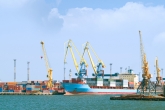Certain types of steel and non-ferrous metals to escape China ban
China has announced that some kinds of steel and non-ferrous scrap metals will be excluded from its ban on imports of foreign waste announced last month, Reuters reports.
Following China’s notification to the World Trade Organisation (WTO) that it would be implementing a ban on foreign waste – particularly plastics and paper imports – last month, Reuters has reported that China’s Ministry of Environmental Protection (MEP) released a list of materials to be excluded from the ban yesterday (17 August). Some scrap metals such as steel, copper, nickel, aluminium, zinc and tin were notable by their absence.
Steel, copper and aluminium scrap from cars, ships and waste electronic and electrical equipment (WEEE) have been listed under ‘limited import’, although the MEP has not divulged what that means exactly. Mining waste containing non-ferrous metals will be banned, however, as China has ample domestic stocks.
Meanwhile, in a statement released on Wednesday the MEP has said it will target recycling facilities dealing with WEEE, plastic, cloth and tyres over the next five months.
Qiu Qiwen, Director at the Soil Environment Management Department of the MEP, said of the statement: "The current recycling system in China is insufficient to meet the demand from the waste processing industry. The inspections will help to eliminate excess capacity and improve the infrastructure of the recycling industry.”
Although the ‘limited import’ classification may leave the domestic metals industry scratching its collective head rather than heaving a sigh of relief, those of a glass half-full disposition will take heart from the fact that these metals have not been banned outright, given that last year China recycled 151.3 million tonnes of steel and 9.37 million tonnes of non-ferrous metals in 2016, importing 2.16 million tonnes of scrap steel and 5.28 million tonnes of scrap copper, aluminium and zinc according to Reuters.
China’s ban on foreign waste imports, planned to be introduced at the start of 2018, has sent shockwaves through the international recycling industry. Many fear that it could cause a rise in packaging recovery note (PRN) prices while others are seeing it as an opportunity to drive quality improvements in the industry.
The ban represents another level in China’s crackdown on environmental standards and imports of contaminated waste, with the National Sword 2017 campaign, launched in February, implementing a policy of rejecting legal shipments of waste that contained excessive non-target materials.
An interview with Qiu Qiwen carried out by China Environmental News can be read (through Google Translate) on the publication's website.








